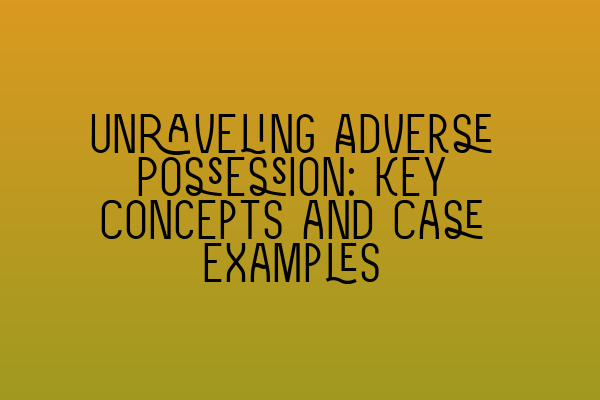Unraveling Adverse Possession: Key Concepts and Case Examples
Introduction
Welcome to the SQE Property Law & Land Law blog! In this post, we will delve into the fascinating world of adverse possession. Adverse possession is a legal principle that allows a person to acquire ownership rights to a property through continuous and uninterrupted possession for a specified period of time. It is a complex area of law that requires a thorough understanding of key concepts and case examples. So, let’s dive in!
Understanding Adverse Possession
Adverse possession refers to a situation where a person who is not the lawful owner of a property gains ownership rights over that property by openly occupying and using it for a certain period of time. This period is typically set by statute and can vary depending on the jurisdiction.
There are several key elements that must be established for adverse possession to be successful. These include:
1. Actual Possession: The adverse possessor must physically occupy the property and have exclusive control over it. Mere occasional or sporadic use will not be sufficient.
2. Open and Notorious: The possession must be open and obvious to the true owner and the public. The adverse possessor cannot hide or conceal their occupation.
3. Continuous and Uninterrupted Possession: The adverse possessor must maintain uninterrupted possession of the property for the required period of time. Any interruption in possession may restart the clock for adverse possession.
4. Hostile and Adverse: The possession must be without the permission or consent of the true owner. This element is often misunderstood, as it does not necessarily require hostility or ill intent towards the true owner.
5. Statutory Period: Each jurisdiction has its own specific time period that must be satisfied for adverse possession to be claimed. This period can range from a few years to several decades.
Case Examples
To better understand the principles of adverse possession, let’s explore a few real-life case examples:
1. Smith v. Johnson
In this case, Mr. Smith had been using a strip of land next to his property as a garden for over 20 years. Although the land belonged to Mr. Johnson, he never objected to Mr. Smith’s use. After the statutory period had passed, Mr. Smith successfully claimed adverse possession of the strip of land. This case illustrates the importance of continuous and uninterrupted possession.
2. Brown v. Green
Mr. Brown occupied a building on Mr. Green’s land without his permission. However, Mr. Green was unaware of Mr. Brown’s presence for the entire statutory period. In this case, Mr. Brown failed to establish the open and notorious element of adverse possession, as his occupation was concealed. As a result, his claim for adverse possession was unsuccessful.
3. Taylor v. Thompson
Here, Mr. Taylor had been using a large portion of Ms. Thompson’s land for agricultural purposes for over 12 years. Ms. Thompson was aware of Mr. Taylor’s occupation but never took any action to prevent it. The court found that Mr. Taylor’s possession was open, notorious, and continuous, leading to a successful claim for adverse possession.
Conclusion
Adverse possession is a complex area of property law that requires a careful analysis of key concepts and case examples. Understanding the elements of adverse possession, such as actual possession, open and notorious use, continuous and uninterrupted possession, hostile intent, and the statutory period, is crucial for both property owners and potential adverse possessors.
If you want to explore more about property law or related legal topics, we invite you to check out our other articles:
– Understanding Contractual Capacity: Rights and Limitations
– Interactive SQE Mock Tests for Contract Law: Test Your Knowledge
– Join Our SQE Contract Law Webinars: Expert Insights and Guidance
– SQE Prep: Mastering the Essentials of Contract Law
– Contractual Capacity: Understanding Legal Competence in Contracting Parties
At SQE Property Law & Land Law, we are dedicated to providing expert insights and guidance on a wide range of legal topics. If you have any questions or need assistance with property law matters, contact us today. Our team of solicitors is ready to help you navigate the complexities of the law and achieve your desired outcomes.
Disclaimer: This blog post is intended for informational purposes only and should not be construed as legal advice. Consult with a qualified solicitor for advice specific to your situation.
